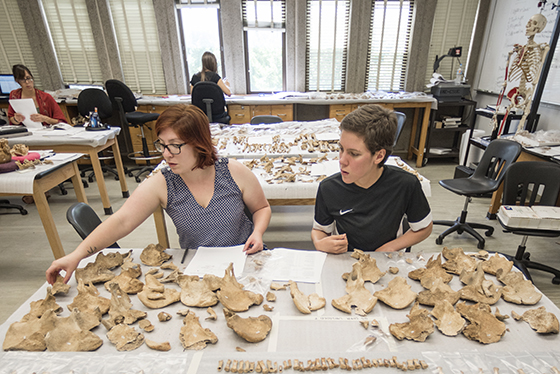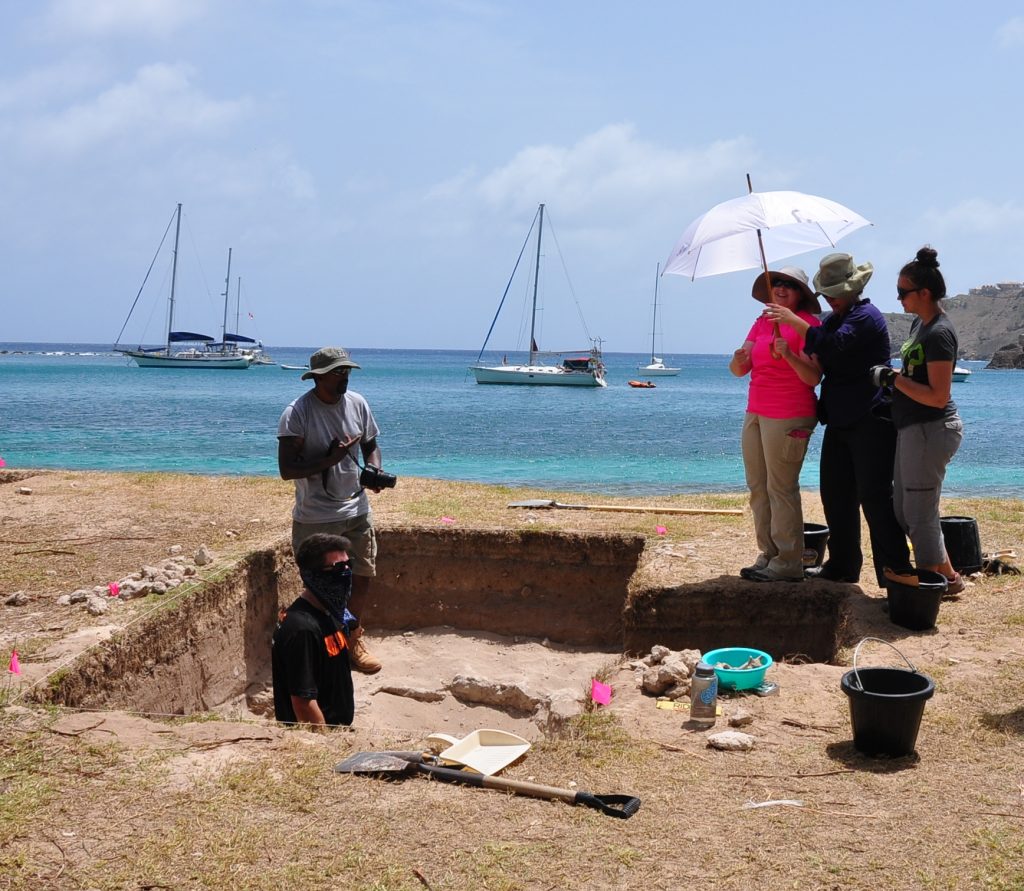Bones Abroad

Anthropology students travel overseas to study ancient human remains
Perspective—it’s central to the mission of anthropology and what evolved for graduate students Sarah Hall and Valerie Sgheiza during their time abroad last summer.
Hall traveled to Bogota, Colombia, to examine and inventory human remains from a 19th-century cemetery, while Sgheiza excavated delicate 17th-century skeletons of British soldiers on the beaches of Antigua in the West Indies.
“I think it’s really important to be connected with scholars from around the world,” said Hall, who studies the subfield of bioarcheology.
So, when Professor Eric Bartelink, president of the American Board of Forensic Anthropology, announced that Claudia Rojas-Sepúlveda at Universidad Nacional de Colombia was looking for a graduate student to work on a large skeletal collection, Hall jumped at the chance.
“I knew Sarah was an extremely meticulous researcher and extremely culturally sensitive,” Bartelink said.
She spent June 2016 in Bogota, taking inventory and conducting a cursory analysis of the remains with Rojas-Sepúlveda and other researchers.
“There weren’t a lot of Americans,” said Hall, who was there as the Colombian government signed a historic ceasefire to end a 50-year conflict with the Farc guerilla group.
Because of land issues caused by Colombia’s history of conflict, Hall says the remains were excavated from the Centro de Memoria: Paz y Reconciliación cemetery to make room for new burials. They will be used to create a skeletal collection for Rojas-Sepúlveda and other researchers to analyze in-depth.
“It has so much potential to tell us about people, about the recent past, and to substantiate portions of history,” she said. And there were some surprises.=
She expected to see evidence of trauma, disease, and other pathologies indicative of poverty or lack of health care access in the 19th century. While some bones revealed cases of rickets, fractures, and cribra orbitalia (an indication of iron deficiency), it wasn’t in the volume she was expecting. They also hoped to see evidence of tuberculosis, which can provide valuable information about the transmission of the disease from old world to new. But, Hall says they had no such luck.
Why? She says it’s too soon to tell, but Rojas-Sepúlveda suspects it may have something to do with La Violencia—a 10-year civil war from 1948–1958—which took place when this section of cemetery was thought to have been used most. While many Colombians fled the war-torn country, it may have caused many people from outside of Bogota to migrate to the city, changing the disease patterns Hall and others expected to find.

She says her Colombian colleagues inspired her to reflect on the relationship American researchers have with international colleagues, governments, and communities.
“Too often, we think of different places as opportunities for our own research—like, ‘I’m going to this country to look at this population, and I’m going to publish about it’—and that doesn’t necessarily contribute to the country or the people that you’re going to,” said Hall, who learned “if you want to work in Colombia, you need to be committed to them and your research needs to contribute to their scholars and their people.”
For Sgheiza, who studies forensic anthropology, she says she gained new tools by participating in Chico State’s Forensic Field School in Antigua, directed by Professor Georgia Fox to connect students to research opportunities
“All faculty in our department do this, because it provides students with experiences that they wouldn’t normally get,” Bartelink said.
On her very first trip abroad, Sgheiza worked with Professor Matthew Brown of Farmingdale State College in New York on bioarchaeological excavations at Galleon Beach. The burial site is home to hundreds of soldiers who had colonized Antigua and whose skeletons will now be housed in university or museum collections.
She says handling the fragile remains of British solders that could crumble without care was a sharp contrast to modern forensic investigations, which often have to be completed in a day or two.
“I think in order to do something quickly, you need to do something slowly,” she said. “And learning methods in archeology is a great way to do that.”
She says Antigua also gave her a different look at the human skeleton.
“I was familiar with where the skeleton is in a living body but not familiar with how it reacts to being compressed under a lot of earth,” said Sgheiza, who was one of four volunteers from Chico State among a team of seven that rotated each week.
While excavating remains and artifacts was serious work, Sgheiza says the site’s location on an island resort offered more visibility and a more laidback attitude of the archeological research—notably different from CSU, Chico Human Identification Lab cases, including the 2015 Valley Fire in Lake County she worked on for the lab.
Sgheiza and about 20 researchers stayed in cottages, hosted by the state’s archeologist, Reg Murphy, and his wife, Nicky. Murphy founded the island’s Field Research Centre, where the remains will be stored for future research. The excavation also attracted historians, museum students, local and Australian documentarians, and earth scientists who were interested in the past and current impacts of the rum business, including lead deposits in the soil.

Beyond the science of excavating and analyzing human remains, both Sgheiza and Hall point to Chico State’s faculty and their real-world experiences as driving home an important message.
“If you’re graduate student from America, you often have a more privileged background, more access to financial and research resources, and you’re coming into that experience with a significant advantage,” said Bartelink, who received positive feedback about Hall from the Colombian researchers she worked with.
Hall says her experience in Bogota will greatly influence her doctoral studies and future work.
“While I don’t necessarily think I would have thought that I could just go to another country and definitely have access (to their human and cultural materials)—seeing the other side, seeing that commitment to the country, to the people, to the cultural heritage of the people and populations that you’re working with—I think you have to ask yourself, ‘Why are you doing the research you’re doing and who is it helping?’” she said.
For Hall, she hopes the relationships she’s built in Colombia with Rojas-Sepúlveda and others will allow her to return to Bogota one day—to conduct research that matters not only to her, but to Colombia as well.
She adds, “This is strictly because of Eric (Bartelink) that I was able to get this opportunity.”
Bartelink says he and other anthropology faculty are deeply committed to using their own past research experiences and professional relationships to connect students to global research opportunities.
“These are once-in-a-lifetime opportunities for students,” he said. “And I could tell you these same kinds of stories about almost all of our graduate students.”


